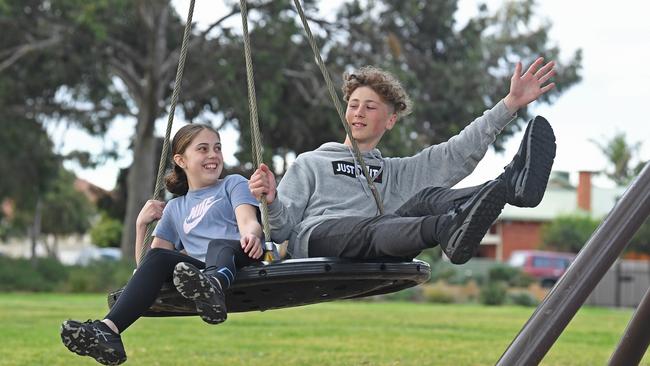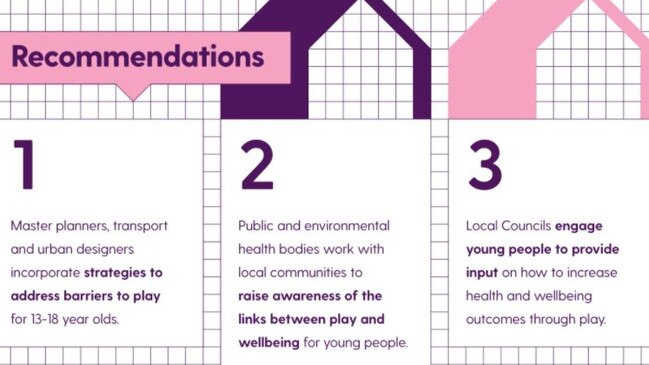Play as important for teenagers as it is for infants, SA research shows
Yes, you should let your teenager play. The benefits of playtime extends way beyond the toddler years, through to a child’s late teens. Here’s why kids need a dose of fun.

Advice
Don't miss out on the headlines from Advice. Followed categories will be added to My News.
- Experts urge rethink on screentime caps for kids
- Single-sex vs co-ed: which most suits modern kids?
- Positives and negatives of Gen Alpha revealed by parents, teachers
Playtime is as important for teenagers as it is for toddlers but they aren’t being given enough chances to engage in it, according to a new report by South Australia’s Commissioner for Children and Young People.
“While much research focuses on the importance of play for young children, rarely is the importance of play for teenagers examined,” Helen Connolly said.
“We encourage teenagers to put their toys away and to spend their time learning about life through school and activities that remove opportunities for play and free time.
“We do this without realising that by doing so we risk impairing their cognitive development and their capacity to learn the social skills they will need to successfully navigate their way into the adult world.
“It could be argued that play actually becomes increasingly more important as children get older.
“If we want critical and creative adult thinkers in our communities, then it is essential that ‘playfulness’ be embedded in the lives of young people … not just something you do until you turn 13.”
Ms Connolly said play was vital to a teenager’s development, health and wellbeing with international research showing a direct correlation between the decline of free play in the lives of children and young people and an increase in anxiety and depression.
More than 500 young South Australians aged between 13 and 18 were surveyed as part of the study, Press Play; Activating young people’s health, and wellbeing through play, which is to be formally released tomorrow.

“Their responses revealed how important play is to (them),” Ms Connolly said.
“It is through play in its various forms that young people engage with their peers, neighbourhoods, cities, towns, and with the world around them.
“It aids in their transition from adolescent to adult because it is the part of their lives that exists outside school and work.
“If young people are to develop their identity, creativity, self-confidence and connections, it is essential to look at how we can structure society to provide young people with more play time, including time to determine how and where they would most like to spend it.”
When asked about practical every day barriers to play, young people said they often felt too tired and too busy with school, homework and other commitments to actually engage in play.
They also expressed concern around the scarcity of community sport and recreational facilities designed specifically for teens, observing most facilities are designed for adults or young children and told of a desire for more access to musicfestivals, art and film.
YMCA SA head of children’s services Komala Champion agreed “playtime” was crucial for teenagers for a host of reasons from reducing stress, to allowing the freedom touse their imaginations, learning appropriate risk-taking behaviours and helping teach teamwork and socialisation.
“Pressure to achieve and anxiety levels are higher than ever for young people, so it’s vital to create outlets to relax and have fun,” Ms Champion said.
“Older children are expected to create their own fun/play and are seen as more independent … it is not actively pursued by parents/caregivers or through the education system and is easily forgotten.”
What the survey revealed
The survey revealed sport was important to many young people, not just playing it but also getting involved in activities around sport, such as going to clubs or games as spectators. Also being part of a recreation group that walks, surfs, or cycles. Or participating in other sport-orientated activities and hobbies such as chess, archery or esports.
When asked general questions about what would make their lives better, young people spoke about their desire for their communities to provide them with more recreational activities, more art galleries and more places for young people to gather, to exhibit and to share their art, hobbies and skills.
In regional centres in particular, young people are looking for a greater variety of movies to be screening at the local cinema, for more local music festivals and events to be held, and for more clubs and classes to be made available to them at affordable prices.
When their interests are supported, young people report more optimism and positivity about the future, as well as that of their local community. Ultimately young people want to play in the ways they decide and to be supported to do so. For a growing number of young people this includes more opportunities to play digital games, viewed both as a great way to play, and as an important way to connect with peers.
Barriers to play for young people have evolved over many years. They have been heavily influenced by the cultural and social changes that have taken place over several generations.
For example, activities such as playing cricket in the street or riding bicycles around the neighbourhood are no longer the norm and are now ‘frowned upon’ by adults and parents because they’re seen as unsafe or interfering with traffic flows. Similarly, young people gathering in parks is viewed more as threatening behavior than community building or accessing facilities. This leads to communities in which young people must seek permission to gather in public places independently of adults, or only gather in designated spaces, which are limited.
Greater support for having ‘more time’ for play and leisure and being given more independence to participate in play and leisure activities was rated very highly. One of the most popular suggestions young people gave to increase free time and opportunities for play, as well as improve mental health, was to be given more time at school to complete homework.
Suggestions around how this could be delivered, included lowering the cost of gym memberships for young people, or offering classes and sports programs aimed at young people at reduced rates. Reducing the cost of transport was amongst the top four things identified as a barrier, including the need to make access to transport ‘easier’, ‘better’ and ‘more reliable’. Others talked about providing more specific opportunities to encourage girls to be more active.

